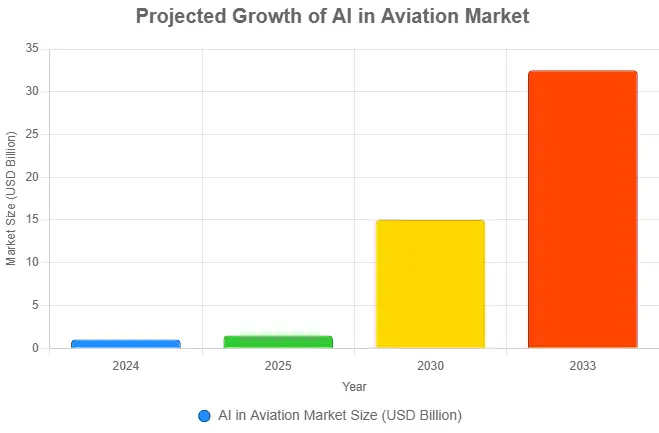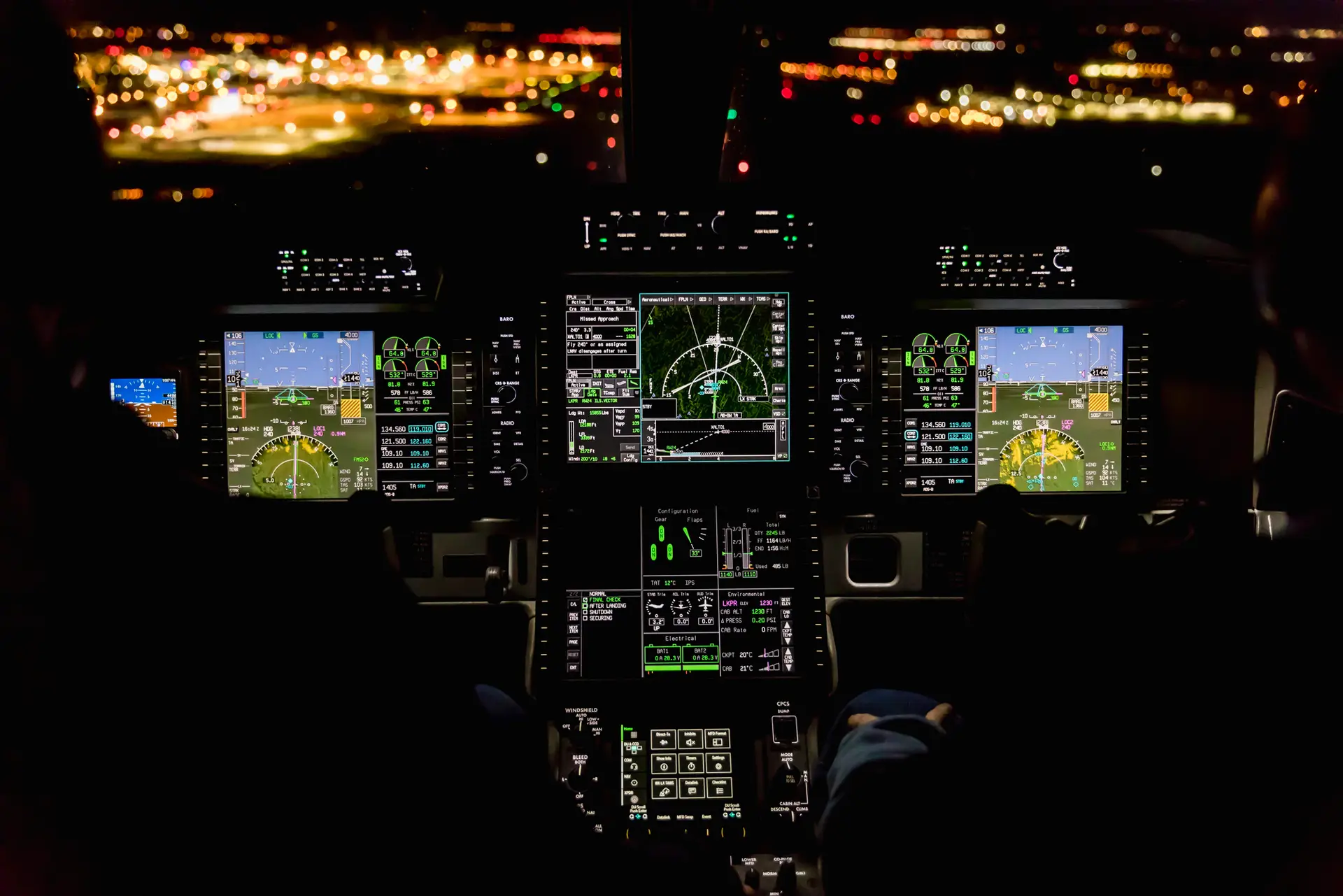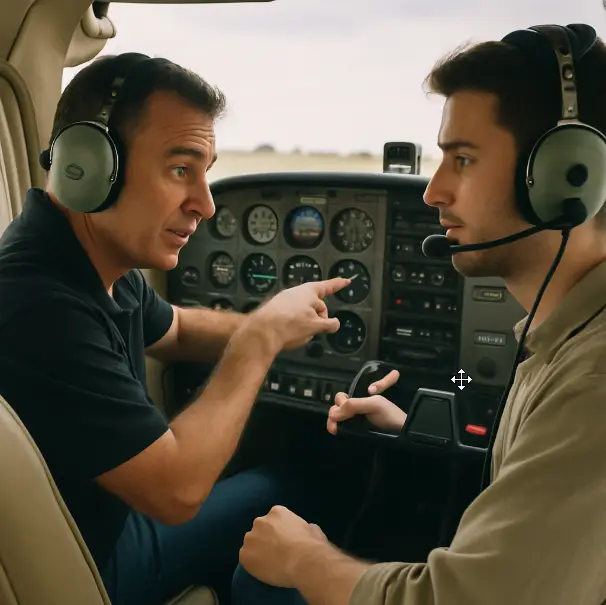Navigating the Skies of Tomorrow: How AI is Reshaping Piloting in Aviation

- aviatorpro_6714
The aviation industry has long been a beacon of technological progress, from the Wright brothers’ first flight to today’s advanced jetliners. As we navigate 2025, Artificial Intelligence (AI) is ushering in a new era of transformation, particularly in piloting. AI is not just enhancing operational efficiency; it’s redefining the role of pilots, shifting them from sole operators to collaborators with sophisticated systems. This article explores how AI will shape piloting over the next few years, the skills future pilots will need, and how platforms like AviatorPro are preparing aspiring aviators for this tech-driven future.
The global AI in aviation market, valued at $1.02 billion in 2024, is projected to reach $1.49 billion in 2025 and soar to $32.5 billion by 2033, with a compound annual growth rate (CAGR) of 46.97% (Straits Research). This explosive growth reflects AI’s expanding role in safety, efficiency, and training, making it a critical focus for pilots entering the industry.
Current State of AI in Aviation
AI is already deeply integrated into aviation, enhancing various aspects of flight operations. Today, pilots benefit from AI in several ways:
- Autopilot Systems: These use AI to maintain aircraft stability and follow predefined routes, reducing pilot workload during long flights.
- Flight Management Systems (FMS): AI optimizes flight paths by analyzing real-time data on weather, air traffic, and fuel efficiency, ensuring smoother operations.
- Predictive Maintenance: By analyzing sensor data, AI predicts mechanical issues, enabling proactive repairs that enhance safety and reduce downtime.
Airlines like Swiss International Air Lines and Lufthansa have leveraged AI to optimize operations, with Swiss saving $5.4 million in 2024 by improving flight efficiency for over half its flights (Vaughn College). These advancements provide pilots with tools that enhance decision-making and safety, setting the stage for more transformative changes.
Future of AI in Piloting
Over the next few years, AI is expected to revolutionize piloting in several key areas, reshaping how pilots interact with aircraft and systems.
AI as a Co-Pilot
One of the most promising developments is AI acting as a co-pilot. Systems like MIT’s Air-Guardian, introduced in 2023, use eye-tracking and saliency maps to monitor pilot attention and intervene during lapses, such as fatigue or distraction (MIT News). Unlike traditional autopilots that activate only in emergencies, AI co-pilots proactively identify risks, potentially preventing accidents. By 2027, such systems could become standard in commercial cockpits, enhancing safety and reducing human error.
Autonomous Flight
While fully autonomous commercial flights are not imminent, significant progress is being made. AI-piloted drones have already outperformed human pilots in competitions, demonstrating AI’s ability to handle complex maneuvers (Avionics International). Companies like Airbus and Boeing are investing in AI algorithms for autonomous flight, particularly for cargo and regional operations (Airbus). However, regulatory hurdles and public trust issues mean human pilots will likely remain essential for passenger flights, overseeing AI systems and handling unexpected scenarios.
Enhanced Safety and Efficiency
AI will continue to improve safety by analyzing vast datasets to predict turbulence, optimize descent profiles, and assist in emergency landings. For example, AI-driven contrail forecast maps, developed by Google and American Airlines, help pilots avoid creating contrails that contribute to environmental impact (Forbes). These tools reduce fuel consumption and emissions, aligning with the industry’s goal of net-zero emissions by 2050 (World Economic Forum).
Training and Simulation
AI is transforming pilot training through adaptive simulations. CAE’s AI-based tools create realistic scenarios that adjust to a pilot’s skill level, providing personalized feedback (Aviation International News). By 2027, these systems could integrate virtual reality (VR) and AI to simulate AI-assisted cockpits, preparing pilots for real-world collaboration with advanced systems.
Challenges and Ethical Considerations
Despite its potential, AI in aviation faces challenges:
- Data Security: Protecting AI systems from cyberattacks is critical, as vulnerabilities could compromise safety (aiola.ai).
- Regulatory Compliance: Certifying AI for flight-critical applications remains complex, with agencies like EASA working on standards (EASA).
- Ethical Concerns: The prospect of reduced pilot roles raises questions about job displacement and public acceptance of autonomous systems.
These challenges highlight the need for careful integration, ensuring AI enhances rather than replaces human expertise.
Impact on Pilot Roles and Skills
AI’s integration will redefine the pilot’s role. Instead of manually controlling every aspect of flight, pilots will become managers of AI systems, focusing on oversight and strategic decision-making. This shift requires new skills:
| Skill | Description |
| Technical Proficiency | Understanding AI algorithms and interpreting system outputs. |
| Data Analysis | Analyzing real-time data from AI systems to make informed decisions. |
| Decision-Making | Knowing when to trust or override AI recommendations in complex situations. |
| Soft Skills | Enhanced communication and adaptability for human-AI and crew collaboration. |
While some fear AI could reduce the need for pilots, experts argue that human oversight will remain critical, especially for passenger flights (aiola.ai). The debate over single-pilot operations or fully autonomous flights remains controversial, with safety and public trust as key concerns.
Training and Education for Future Pilots
To succeed in this AI-driven landscape, aspiring pilots need training that blends traditional skills with technological proficiency. Modern training platforms are essential for preparing pilots to work alongside AI systems.
AviatorPro is at the forefront of this evolution, offering adaptive, scenario-based training (SBT) that immerses learners in realistic situations. This approach enhances critical thinking and problem-solving, skills vital for navigating AI-integrated cockpits. AviatorPro’s courses reduce training time by 40% compared to traditional methods, making it an efficient choice for earning a Private Pilot’s License (PPL) and beyond (AviatorPro).
Flight schools benefit from AviatorPro’s platform, which allows instructors to assign lessons, track progress, and generate performance reports. This streamlines training and ensures students are well-prepared for both FAA exams and real-world challenges.
Promoting AviatorPro.com
AviatorPro is more than an online ground school; it’s a gateway to a tech-forward aviation career. Its comprehensive curriculum covers essential topics like Instrument Flight Rules (IFR), communications, and multi-engine training, aligning with the industry’s technological advancements (Fly AOA Media). By focusing on SBT, AviatorPro ensures students are ready to handle complex scenarios, from weather challenges to AI-assisted decision-making.
For aspiring pilots, AviatorPro offers:
- Efficiency: Students complete courses faster, with endorsements for FAA written exams.
- Practical Training: SBT prepares pilots for real-world challenges, including AI integration.
- Community Support: A platform built by aviators, fostering a community of excellence and safety.
Flight schools can leverage AviatorPro to enhance training programs, making it an ideal partner for institutions and individuals alike. Aspiring pilots starting their journey with AviatorPro gain a competitive edge in an AI-driven aviation world.
Conclusion
AI is poised to transform piloting, making flights safer, more efficient, and sustainable. Over the next few years, pilots will increasingly collaborate with AI co-pilots, manage advanced systems, and adapt to new roles. While challenges like regulation and public trust remain, the opportunities for enhanced safety and efficiency are immense.
For those dreaming of a piloting career, now is the time to prepare. AviatorPro offers a modern, efficient, and practical training solution, equipping aspiring pilots with the skills to thrive in this evolving industry. By embracing platforms like AviatorPro, future pilots can confidently navigate the skies of tomorrow.



